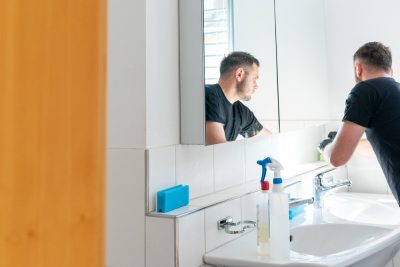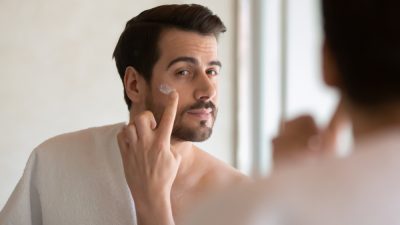Caring for the skin shouldn’t be for only when we are going out on special occasions and want to look especially attractive that one day. Caring for the skin is just as important as caring for our stomach when we are hungry, or brushing our teeth every day to prevent tooth decay.
The skin being the largest organ in the body requires more attention than most of us tend to give. A measly cold rainy morning and some of us will refuse to bathe and yet, on the evening of the same day, we wear perfume to mask the odor oozing from stinking flesh. What shall it profit a man to look good but smell bad?
Here are the seven proven best ways to care for the skin:
NUTRITION
Heredity or age aside, the requirements for healthy skin comes down to nutrition. The proverbial saying ‘ you are what you eat’ is in fact scientifically accurate because the food we eat is not only responsible for providing nutrients, fuelling, or affecting homeostasis but also affects the outer fabric of our body.
Everything you eat becomes a part of you. One of the most important components of the skin is vitamin A which is gotten from foods like dairy, carrot, liver, fish, broccoli, etc. Deficiency of vitamin A in our diet affects healthy skin and can lead to skin problems such as inflamed skin, rashes.
Experts say that a lot of skin problems such as acne, wrinkles, freckles, napkin dermatitis, and skin hyperpigmentation are linked to some vital nutrient deficiency such as in our system caused by poor diets. Some nutrients needed by our body to promote healthy skin includes;
Vitamin A: The best source of vitamin A is cod liver oil, other sources include eggs, spinach, beef, liver green leafy vegetables, dried apricot, etc. vitamin A regulates the production of skin cell such as keratin, supports the skin immune system and helps to hydrate the skin giving It a radiant glow and also helps protect the skin by making it less vulnerable to sunburn and pigmentation.
Vitamin B: vitamin B commonly found in eggs, salmon, milk, fish, meat, legumes such as beans, lentils. Helps in the production of healthy skin cells. Correction of hyperpigmentation and is a potential treatment for acne and rosacea.
Vitamin C: sources of vitamin C include mango, papaya, pineapple, kiwi, watermelon, citrus fruits such as orange and kiwi. It helps in the repair of damaged skin cells, reduce wrinkles and reduce the production of melanin in the skin which helps to lighten hyperpigmentation and brown spots, it also helps to reduce the damages caused by ultraviolet rays. The deficiency of vitamins in our system impairs the healing of wounds due to loss of mature collagen which in turn leaves the wound open for a longer time.
Vitamin D: vitamin D can be gotten from salmon, mushrooms, egg yolks, tuna, mackerel, fish liver oil. Vitamin B in our diet prevents skin from premature aging and helps to correct skin problems like eczema, dry skin. Deficiency of vitamin D leads to acne vulgaris.
PERSONAL HYGIENE
- Personal hygiene is very important in the society, not just for social reasons but also for good health. Keeping our body clean is necessary for preventing illness and can also help to curb the spread of infectious diseases. Personal hygiene shouldn’t just be practiced occasionally, it should be adopted as a lifes
 tyle.
tyle. - The saying ‘prevention is better than cure’ also relates to personal hygiene, I would take being clean and infection-free over curing one. A clean lifestyle doesn’t just involve taking care of our body alone, it also involves taking care of things surrounding our body at a particular place including our rooms, toilet, and kitchen.
Adopting a clean disease-free lifestyle involves a variety of activities that sums up to personal hygiene which includes;
- Washing hands with soap and water after going to the toilet. The toilet is like the official dwelling place for bacteria and other disease-causing microorganisms. Washing of toilets and bathrooms at least once a week is also important to prevent spots and hinder the accumulation of germs.
- Washing the body at least twice a day. It’s advisable to bathe morning and night, the morning before our daily activities and night after our body must have been covered in germs from different physical contacts made during the day and also washing the dead skin cells off your epidermis to prevent diseases.
- Cleaning of teeth twice a day; morning 30 minutes after breakfast and night after dinner. The importance of a clean tooth cannot be overemphasized, it helps to maintain good oral hygiene and prevent a variety of dental-related health problems such as mouth sores, tooth erosion, tooth decay, toothache, and a dental emergency.
- Taking care of our nails involves cleaning and trimming to prevent dirty and infected nail beds.
- Wear clean clothes always: avoid putting dirty clothes on especially after bathing to prevent body odor and skin irritation.
- Cover your mouth when you sneeze to prevent the spread of bacteria to people around you.
- Visit the doctor at least once a month for medical checkups, this can help to catch infections and illness early and treating them early.
SLEEP
You can always easily tell that getting a poor night’s sleep doesn’t do wonders for your face, 8 hours of sleep time is recommended for a day. Firstly, you should understand that sleep time is the time your body repairs itself, during sleep, blood flow in the dermis increases, and organs rebuild its collagen and repairs ultraviolet-induced damages.
Sleep has many health benefits to the body’s internal and external environment. The consequences of poor sleep are numerous; pale skin, skin ages faster, dry skin, rashes, infections, acne outbreaks, and large pores.
MOISTURISING
Dermatologists suggest that we moisturize our skin twice a day, once in the morning and also before going to bed at night. Moisturizing the skin enhances healthy skin and also helps to prevent several skin problems.
5 reasons you must moisturize your skin;
- It helps to slow signs of aging and fight wrinkles.
- Moisturizing the skin prevents dryness during frosty air season and hot weather.
- It enhances a healthy facial appearance.
- It protects us from ultraviolet radiation.
- It helps to soothe sensitive skin.
- We need to make caring for the skin a priority in our daily activities as there are numerous benefits, also dangers such as health issues arise when we don’t.
- A clean body equals a healthy and disease-free body.




